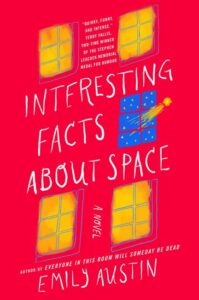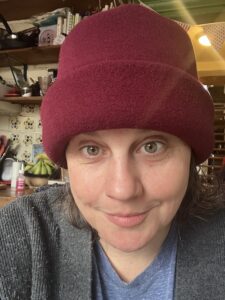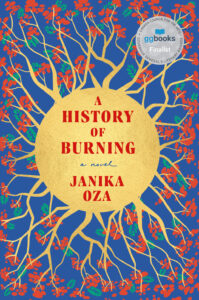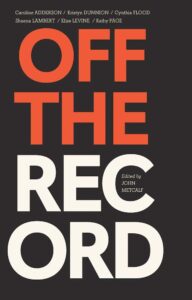January 22, 2024
Taking Stock for January
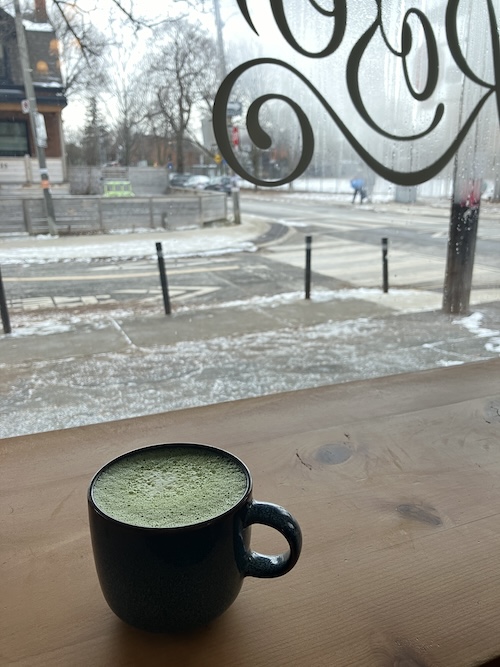
Getting: Ready to start booking summer camping trips, which is my favourite winter vice. (Ontario Parks reservations open up five months in advance!)
Cooking: Soup, soup, always soup. The chicken dumpling soup in Smitten Kitchen’s Keepers is a life changer!
Sipping: WATER. Water that’s not infused with tea, because water is one of my New Year’s Resolutions, in terms of ingesting and marinating in via frequent visits to a steam room.
Reading: Interesting Facts About Space, by Emily Austin, and just as wonderful as I’d hoped as a follow-up to Everyone In This Room Will Someday Be Dead.
Thinking: About the person who tried to shame me on Friday for LIKING and then UNLIKING her Facebook post (even though I did like it, and explained as much, but I had pressed LIKE and immediately felt a sense of dismay at the gamification of my feelings AND then the whole ensuing fallout really underlined that my instinct to disengage was quite correct in the first place.
Remembering: to experience the moment/season I’m in right now rather than rushing to the next one
Looking: at the snowy powder on the porch outside. I don’t hate it!
Listening: to the Kara Swisher podcast conversation with Heather Cox Richardson. Why can’t I stop listening to US politics podcasts? I don’t know!
Wishing: The US politics was boring.
Enjoying: The slowness of January as we ease into the new year
Appreciating: Any time the sun shines and the sky is blue
Wanting: More opportunities to promote my novel this spring.
Eating: A McVities digestive biscuit! (Plain, not chocolate)
Finishing: The first essay in my new substack, which will make its debut next week! It’s about re-reading Danielle Steele after 30 years!
Liking: Spending less time on social media and improving my focus by writing long form
Loving: Taking more time in the whirlpool and steam room at my gym.
Buying: A new winter hat! (It’s so good!)
Watching: I introduced my kids to the 1990s movie MERMAIDS starring Cher, Winona Ryder, and Christina Ricci last weekend, and (to my great joy!) they loved it (and it really did hold up!)
Hoping: To be able to keep my January sense of chill as life begins to speed up again.
Wearing: A cardigan, OBVIOUSLY. Because I am a human person with arms and it’s January.
Walking: Carefully on the slippery sidewalk
Following: the trajectory of my 10-year-old’s illness (which is the first time either of my kids have been sick this school year. We’re pretty lucky!)
Noticing: The light lasting longer every day
Saving: A packet of Mini-Eggs that I bought right after Christmas on sale. My daughter asked me if I’d forgotten we had them. I haven’t forgotten. I just like having them.
Bookmarking: Every piece in TNQ’s Writing In/During Crisis series. Have you read them? You should.
Feeling: Good!
Hearing: The mysterious babble of my very noisy 15-year-old fridge.
January 22, 2024
A History of Burning, by Janika Oza
While A History of Burning arrived in my mailbox months ago, it’s taken me some time to finally get to it, because it’s a big book, in terms of scope and word count, and the literary autumn is always overwhelming, and so I’ve been glad for the slowing-down-ness of January and the chance to finally get to dig in to this book that’s garnered so many accolades from writers I admire, plus an honoured spot among finalists for the Governor General’s Literary Award for Fiction.
Spanning almost 100 years, the novel begins with Pirbhai, aged 13 in 1898, tricked into leaving his mother and sisters and boarding a boat for Kenya where he spends the next few years as an indentured worker building a railway for the British. Eventually he marries Sonal, another Indian in Kenya, and together they set off for Uganda in pursuit of a better life, which they achieve, and their son, Vinod, grows up happy and hale. He has dreams of pursuing a university education, but his parents don’t have the means for that, and so he does the best he can with his marriage to Rajni, who doesn’t want to marry a stranger, but Karachi in 1947 is dangerous, and Rajni’s parents feel she’ll be safer in Uganda, so she goes, and the two build a life upon the foundation of Pirbhai and Sonal’s big dreams for life and prosperity, though it’s not long before their world is disrupted by Uganda’s independence, a movement embraced by the Vinod and Rajni’s spirited eldest daughter, Latika. And in 1972, as Asians are expelled from Uganda under the brutal tyranny of Idi Amin, the family loses everything, forced to begin all over again in a new life in Toronto.
The narrative moves between these family members, as well as others, to paint an ambitiously broad picture of this family’s story, the exiles they’re forced into together and apart. And while there were moments I wished the story had drilled down deeper into specific characters’ experiences, the story’s broadness and grand sweep were necessary to show the ways in which the same patterns of loss, heartache and exile recur so many times over a century, the unrelenting violence of colonialism and its echoes. The many ways too in which human beings are able to other their neighbours, regard them as inferior, fall under the spell of autocracy. Such gorgeous writing: “They held their voices low, because they knew: how a dictator’s word becomes the world, how he bends reality before him, how it was not the facts that would determine their lives, but the whispers, the rumours spilling between.”
January 19, 2024
Who’s That Girl?, by Mhairi McFarlane
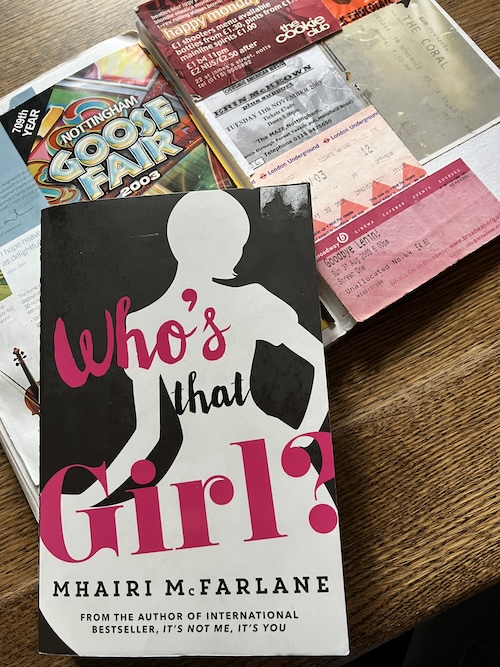
“The Midlands were in-between, just like she was, and the landscape, flat and unassuming, suited her needs. Low and soft, just like a heath, an ideal place for her to land.” —Asking for a Friend
I didn’t know how much it would mean to me to open the pages Mhairi McFarlane’s Who’s That Girl? and be transported back to the city of Nottingham. I haven’t been this excited to be back since I first read Saturday Night, and Sunday Morning, except back then it had only been a handful years since I’d lived there, and now it’s been more than 20. More than 20 years since the last time I walked down Mansfield Road, and then up Sherwood Rise on my way to my little house in Basford. More than 20 years since I’ve been to a Goose Fair, visited the Old Trip to Jerusalem Pub, or contemplated the spiritual distance between West Bridgford and The Meadows. 20 years ago, there wasn’t a burger joint in The Lace Market, but I was so excited when McFarlane’s protagonist, Edie, goes to The Broadway. Her best friend gets divorced and moves into a depressing bachelor pad in Sneinton. She hangs out at the Arboretum. A picnic at Wollaton Hall! I was only disappointed that she doesn’t actually realize her dream of finding ducks to feed on her birthday, because I was very into ducks when I lived in Nottingham, and she wouldn’t have had to search so far to find some.
That, for very personal reasons, I was captivated by this novel about a young woman who slinks into Nottinghamshire with her whole life in shambles (Edie has just attended her work colleagues’ wedding in Harrogate [it becomes Harrogate-gate] and been caught snogging the groom, even though the groom was snogging her, but no matter, she’s on the verge of losing her job as well as her social standing, and her only chance at redemption is coming back to her hometown and ghostwriting the autobiography of a pampered movie star, who is also a Nottingham native) doesn’t mean that this isn’t a story that anyone might enjoy. This is the third novel I’ve read by McFarlane, and I think I love her. She writes romance in which the romance itself takes a backseat to complicated and difficult stories of living through and overcoming trauma, complete with vivid characterization and sparkling humour.
PS A McFarlane has just announced that a sequel to Who’s That Girl? is coming out this year!
January 18, 2024
CNOY 2024 in support of the Fort York Food Bank!
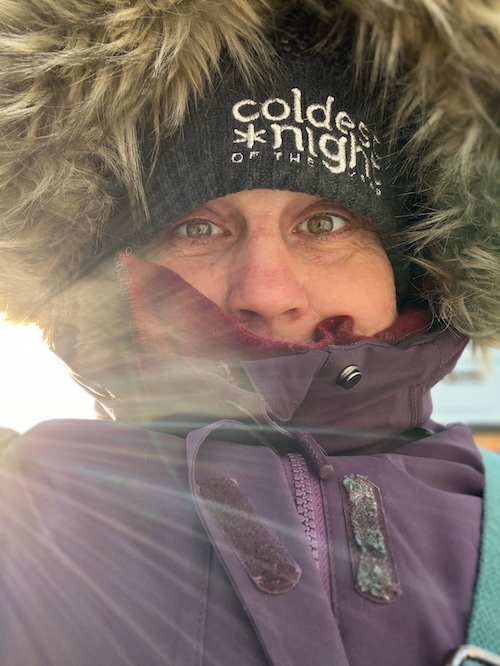
It’s cold out there, and so many people need support more than ever. This will be my third year participating in the Coldest Night of the Year fundraiser in support of my neighbours at the Fort York Food Bank and I hope you will support me. If you’re local, consider joining my Harbord Village North team and walking with us on February 24. If you can’t make it or if you’re further afield, please consider making a donation here.
The food bank has set an ambitious goal of raising $200,000, reflecting the fact that they’re receiving more clients than ever before, currently more than 4600 a week. The Fort York Food Bank are doing essential work these days and I’m grateful for an opportunity to help.
January 17, 2024
Off the Record, edited by John Metcalf
I’ve written before about my aversion to self-mythologizing male writers, how much space such hot air takes up in so many rooms, a logical counter, of course, being more women encouraged to see themselves as subjects of grand narratives, to tell their own stories in their own voices, and so enter Off the Record, an anthology of essay-interviews with six writers who’ve worked with editor John Metcalf over the years. Metcalf continuing the editor’s work of self-effacement in this volume, his questions removed from the interviews so just the writers’ voices remain, each interview telling the story of one writer’s becoming, followed by a short story by the writer in question, the fiction as a kind of arrival.
Keep your pencil handy, for this is an underlining, notes (and hearts) in the margins kind of book, with highlights like this from Kristyn Dunnion: “Good writing often embodies a numinous quality, sifting through echoes of other lives lived, connecting clues in an attempt to find meaning: ghost hunting.” Dunnion, along with Elise Levine, two of the writers included here whose work I’m not familiar with, but I appreciated their pieces just as much as those by Caroline Adderson, Cynthia Flood, Shaena Lambert, and Kathy Page, all of whom have written books I’ve loved. The ways in which each of their journeys have been different, but the commonalities too (quite a few backgrounds in activism informing the imagining of fictional worlds). Complicated relationships with parents, publishing journeys that affirm something my friend Marissa Stapley shared not long ago, about a writing career as a marathon, not a sprint, rife with as many downs as ups. The publishing business has always been fraught, and a book deal has never been the end of the story, but maybe we’d be sorry if it was.
From Shena Lambert: “Showing makes our worlds more believable. But this is a secular way of understanding what is actually more like a magical question. In fiction, anytime you press into the five senses, you will write something specific, something, precisely because of its singularity, which will begin the strange work of making meaning. Things of the earth want to be doors into something greater.”
THINGS OF THE EARTH WANT TO BE DOORS INTO SOMETHING GREATER. I don’t know a better explanation of fiction-making, which is to say meaning making, than that.
January 15, 2024
Gleanings

Special edition of “Gleanings” with pieces from The New Quarterly’s stunning “Dispatches: Writing In/During Crisis.” I’m so grateful to TNQ and all the writers who contributed.
- You don’t need to know the answers. Writing is driven by questions. Readers want to see you stumble toward truth. I give them permission to be uncertain, to search, to fail. Be patient toward all that is unsolved in your heart, I tell them, quoting Rilke. Live the questions now.
- End this war. As the great soul Vivian Silver, murdered so brutally by Hamas, told her beloved Palestinian and Israeli friends: There is no road to peace. Peace is the road.
- With the intensity of the ruination it has created and continues to create in Gaza, Israel seems to have ambitions to destroy our ability to imagine at all. As a writer, I felt particularly attuned to it.
- This language—the power it carries—cleaves me. I think to myself, naively, that if the world understood the beauty of this moment without the blunting, the thinning translation into English for it to be understood, this earth-shattering moment in Arabic, they might care about this girl, and this man who saves her from the death she thinks she’s experiencing. I think about how journalistic language describing Palestinian men and girls like them is rarely this beautiful, this tender, this poetic. Western audiences never see this beauty because not only do we reduce and censor the language we use about Palestinians, we can barely even speak about them at all.
- Was it possible to be blameless and innocent? What would it mean to create a house with “no more padding between the word and the world”?
- I believe that it is my particular obligation as a Jewish writer and one who has written about persecution and genocide to speak out about this. I know that many in my (Jewish and other) community will be angry and upset with me. That they will be horrified that I don’t centre the hostages and the loss experienced on October 7th. It’s not that I don’t understand the pain or want those humans returned to safety. Or that I support Hamas or don’t wish for a different political leadership and solution in Gaza. It’s that I believe the horrifying events happening there meet the definition of genocide. We’re in the middle of a genocide. Never again.
- To choose to embrace suffering, whether in experiencing or witnessing it, though our fears may tell us we’re unequipped to handle that. To choose not to stay trapped within the suffocating boundaries of comfort, though our fears may tell us they’re the only thing keeping us safe. Perhaps most of all, to embrace our inherent wildness, the endless contradictions and complexities of ourselves and others, though our fears may tell us that will leave us unmoored without the ballast of simpler, easier moralities./ Only then, perhaps, can we say we’re truly alive. The words come unbidden after that.
January 15, 2024
One-On-One
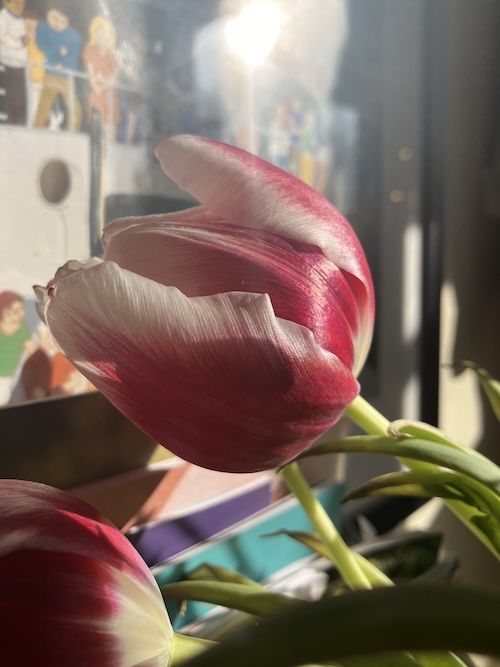
Yesterday I sat on my couch beside a friend who scrolled and scrolled through the vacation photos on her phone, two weeks in Japan, and it occurred to me that I can’t remember the last time I partook in such an activity, and also how much it fulfilled me. How different it felt to see her trip and hear her stories, rather than just aimlessly scrolling through them on my own social media feeds, how such a thing stands for everything I’m yearning for right now, one-on-one contact, live and in person. I have found existing so much on a virtual realm overwhelming and confusing as I try to make sense of my connections to others, what’s required of me, and what I should expect in return. I am having the unsurprising revelation that maybe human beings are not meant to have 3700 friends—who knew? So going back to basics, and grateful for the ability to share meals together, visit in our homes, have conversations over tea and coffee, all those things that until 2020, it never would have occurred to me to take for granted. And how completely they can fill my soul.
January 11, 2024
Penelope Mortimer: About Time (Too)
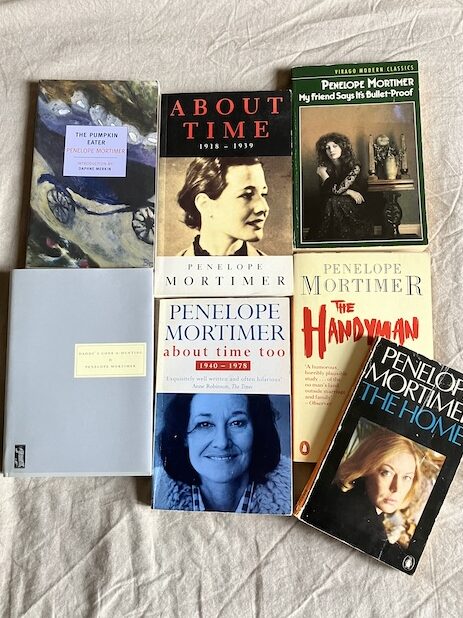
“Of all the Penelopes, Mortimer is my favourite,” I wrote in 2018, though I don’t think I’ve read her since then, and need to refresh my memory, especially now that I’ve just read her two memoirs, ABOUT TIME and ABOUT TIME, TOO. Penelope Mortimer is a standout in my library for being the only author whose books I own in editions from Virago Modern Classics, Persephone AND NYRB (plus two regular old orange-spined Penguins, even though THE HANDYMAN has fallen to pieces). I first learned about her from Carol Shields’ and Blanche Howard’s collected letters, in which they raved about THE HOME, which I loved so much. I actually have no recollection of reading DADDY’S GONE A_HUNTING, a 1958 novel about a mother procuring an abortion for her daughter. I took THE PUMPKIN-EATER, perhaps her best-known book, on a beach side holiday about ten years ago and found it wholly unsatisfying for the occasion, but I think I will appreciate it better now having read its author’s memoirs, for this novel—like all of her novels—was borne of her experience, and that context might just be essential.
In ABOUT TIME, TOO, she writes about looking back on her childhood as a kind of Eden, though it doesn’t read like that me in her first memoir, instead a middle-class English experience of sexual abuse and emotional deprivation, but she recounts it all so jollily that one might just be convinced. The second paragraph of ABOUT TIME begins, “Fortunately I know nothing about my ancestors, and see no particular reason to find out,” and I actually LOVE that, but it’s also emblematic of Mortimer’s refusal to engage with the heart of things, even if such refusal is why the memoir is a pleasure to encounter. The pain in ABOUT TIME, TOO is much more visceral, immediate (a lot of the book is taken from Mortimer’s journals), mostly surrounding the breakdown of her marriage to playwright John Mortimer, her second husband. In between the two husbands, she had two children with two more different fathers, having six children in total, and between the lines one might read some regret about how her children might have suffered by their parents’ unconventional choices, but not too much, and I admire the way Mortimer never apologizes for her sexual appetites, or for her creative impulses, her need to be writing and creating. “The only way to love it all is to cling to it too fiercely. I don’t want to let anything else, anyone else, in. My comfort is the idea of writing this novel. My aim is to keep alive.”
January 9, 2024
Gleanings
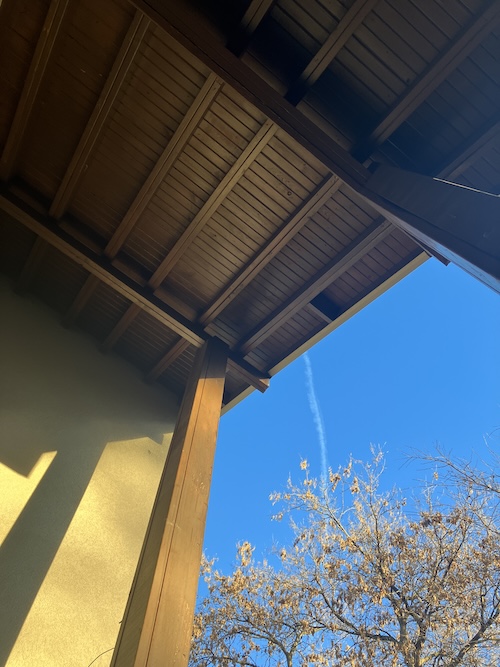
- A good dinner knocks the rough edges off a day, and Melissa’s chicken was better than good, especially with the Vouvray Paul chose for the occasion. Who knew what sherry and sesame oil could do for a No Frills date? Paul poured the last of the wine. “You always were a cheap date,” he said. “A coffee and a Danish at the Alps Riviera.”
- But I only recommend starting a newsletter if you are interested in the newsletter as a project in and of itself. If you are going in expecting your newsletter to translate into major book sales (and you’re not already a household name), it will likely be disappointing.
- I know those things that get me in the flow (painting, reading, writing, walking). But what I want to do is go deeper into it, that flow. And once I’m there, to take it slow. I’m not one for making resolutions, but I do try to set some intentions and make plans, although I don’t hold myself steadfastly to them.
- Law is not the only way to be reborn
- Finally, the thing that really captured me was that The Shamshine Blind tells a story about the ways that grief and hopelessness intersect. As I continue to ache from my own losses in 2023, as I keep watching the news and feeling despair about life and the world, reading Agent Curtida’s emotional processing struck something tender in me.
- I have been writing since I was seven years old. I had a teacher who made empty book templates and she told the class to write a story. I wrote a book called The King which was about a lion who was the king of the jungle and a tiger who tried to take over the kingdom. Coincidentally, I wrote this book before the Disney movie The Lion King came out. My teacher told me that I had a great imagination and I should keep writing, and that’s exactly what I did.
- The company of readers – the people we love and the people with whom we share this love – is a rare, rich and utterly special fellowship.
- In each the role of religion, the way in which images of the enemy are embedded in the holy narratives of each people, cannot be ignored.
- I’ve told my kids for a long time that I think staying soft in a hard world is by far the strongest thing I’ve ever done.
January 8, 2024
One Hand in My Pocket
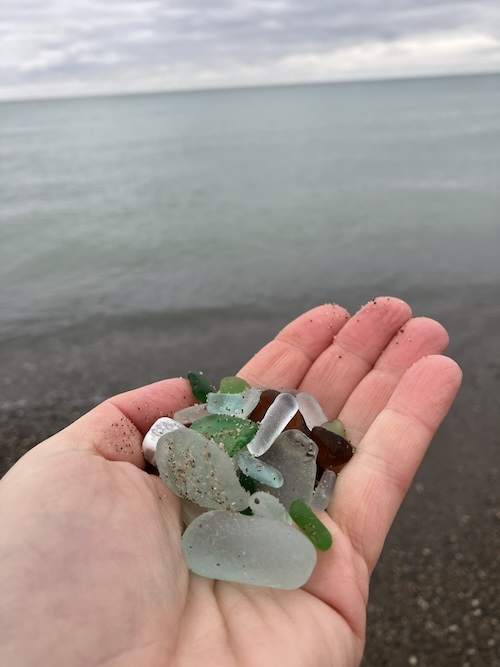
I’ve been thinking a lot about Shawna Lemay’s New Year’s post, “Learning to Be Of Two Minds,” mostly because my own personal 2024 quest (which is to be more human) involves precisely that, I think—even if I also struggle with this sense that I possibly might not know my own mind, the voice in my head consistently taking down any coherent narrative I’m offering it, which is exhausting, flip-floppy, though maybe the problem is that I’ve not learned to be of two minds, but rather my two minds are forever in conflict, which is something I need to resolve, to learn to let those two minds be.
Shawna’s post (which quotes Alanis Morissette and Marilynne Robinson) spoke to me in two (of course!) central ways, both creatively stimulating. First, it made me realize that the title of the novel which I’m working to have a new completed draft of by the end of the month needs to be titled ONE HAND IN MY POCKET. Why? Because it’s about a character whose life is a work in progress, a woman for whom it all comes down to that she “hasn’t got it all figured out just yet.”
And second, because of how the idea of having one hand in my pocket (as well as not having it all figured out just yet) really speaks to me in terms of where I’m at personally, and creatively. I feel like I’ve spend the last 10+ years showing all my cards, sharing my process, all the time, and that kind of openness has become unsatisfying.
In a piece in The Toronto Star this week (promoting her new book Let It Go), author Chelene Knight writes: “When I share something painful or heavy, I ask myself what I need in return and ensure I share my pain in spaces where I can receive what I need. I’m grateful for my intentional community. This is why social media is more of a highlight reel for me — the online world doesn’t get to have both my joy and my pain; they receive only the pieces I’m willing to give away because it’s unlikely I’ll get back what I need. But sadly, we don’t always consider social media as an intentional exchange.”
In 2024, I want to be more thoughtful about such transactions, and keep more things—more the joy and the pain—just for me, and the people in my life. Which is to say, I want to keep one hand in my pocket (and the other one is giving a high five. Or gathering sea glass. Probably not flicking a cigarette).
